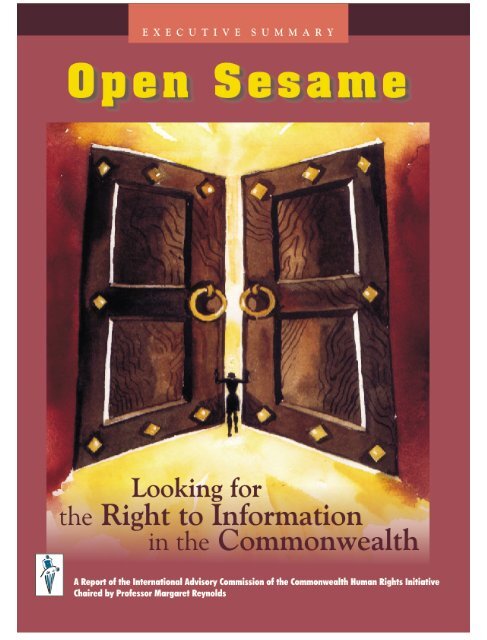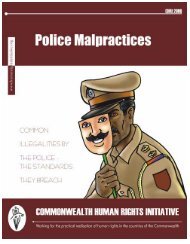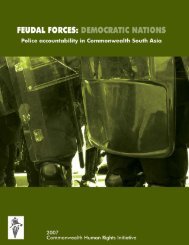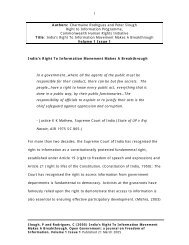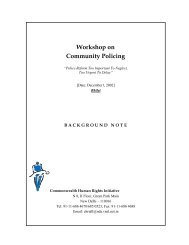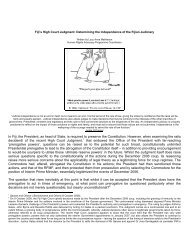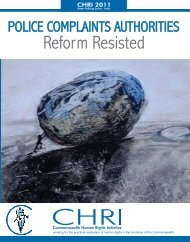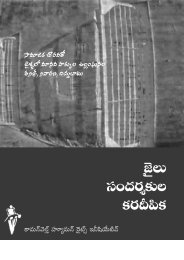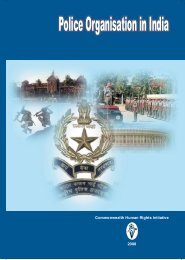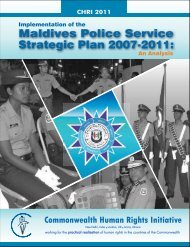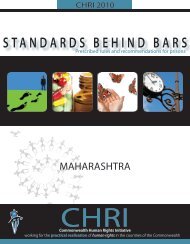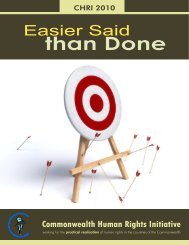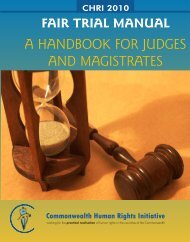chri executive summary 2003: looking for the right to information in ...
chri executive summary 2003: looking for the right to information in ...
chri executive summary 2003: looking for the right to information in ...
- No tags were found...
You also want an ePaper? Increase the reach of your titles
YUMPU automatically turns print PDFs into web optimized ePapers that Google loves.
CHRI EXECUTIVE SUMMARY <strong>2003</strong>: LOOKING FOR THE RIGHT TO INFORMATION IN THE COMMONWEALTH1
Commonwealth Human Rights InitiativeThe Commonwealth Human Rights Initiative (CHRI) is an <strong>in</strong>dependent, non-partisan, <strong>in</strong>ternational non-governmentalorganisation, mandated <strong>to</strong> ensure <strong>the</strong> practical realisation of human <strong>right</strong>s <strong>in</strong> <strong>the</strong> countries of <strong>the</strong> Commonwealth.CHRI was founded by Commonwealth Associations <strong>in</strong> 1987 because <strong>the</strong>y felt that while <strong>the</strong> member countries of <strong>the</strong>Commonwealth had a common set of values and legal pr<strong>in</strong>ciples from which <strong>to</strong> work, and also provided a <strong>for</strong>umwith<strong>in</strong> which <strong>to</strong> promote human <strong>right</strong>s, <strong>the</strong>re was little focus on <strong>the</strong> issues of human <strong>right</strong>s with<strong>in</strong> <strong>the</strong> Commonwealth.The objectives of CHRI are <strong>to</strong> promote awareness of and adherence <strong>to</strong> <strong>the</strong> Harare Pr<strong>in</strong>ciples, <strong>the</strong> Universal Declarationof Human Rights and o<strong>the</strong>r <strong>in</strong>ternationally recognised human <strong>right</strong>s <strong>in</strong>struments, as well as domestic <strong>in</strong>strumentssupport<strong>in</strong>g human <strong>right</strong>s <strong>in</strong> Commonwealth member states.Through its reports and periodic <strong>in</strong>vestigations, CHRI draws attention <strong>to</strong> progress and setbacks <strong>to</strong> human <strong>right</strong>s <strong>in</strong>Commonwealth countries. In advocat<strong>in</strong>g <strong>for</strong> approaches and measures <strong>to</strong> prevent human <strong>right</strong>s abuses, CHRI addresses<strong>the</strong> Commonwealth Secretariat, member governments and civil society associations. By hold<strong>in</strong>g workshops anddevelop<strong>in</strong>g l<strong>in</strong>kages, CHRI’s approach throughout is <strong>to</strong> act as a catalyst <strong>for</strong> activity around its priority issues.The nature of CHRI’s sponsor<strong>in</strong>g organisations* – journalists, publishers, broadcasters, lawyers, legal educa<strong>to</strong>rs,health professionals, trade unionists, and parliamentarians – ensures both a national presence <strong>in</strong> each country anda local network. More importantly, <strong>the</strong>se are strategic constituencies, which can effectively steer public policy <strong>in</strong>favour of human <strong>right</strong>s by <strong>in</strong>corporat<strong>in</strong>g human <strong>right</strong>s norms <strong>in</strong><strong>to</strong> <strong>the</strong>ir own work and act<strong>in</strong>g as a conduit <strong>for</strong> <strong>the</strong>dissem<strong>in</strong>ation of human <strong>right</strong>s <strong>in</strong><strong>for</strong>mation, standards and practices. As such, <strong>the</strong>ir <strong>in</strong>dividual members and collectivesare <strong>the</strong>mselves capable of affect<strong>in</strong>g systemic change. In addition, <strong>the</strong>se groups br<strong>in</strong>g knowledge of local situations,can access policy makers, highlight issues, and act <strong>in</strong> concert <strong>to</strong> promote human <strong>right</strong>s. The presence of em<strong>in</strong>entmembers of <strong>the</strong>se professions on CHRI’s International Advisory Commission assures CHRI credibility and access <strong>to</strong>national jurisdictions.Orig<strong>in</strong>ally based <strong>in</strong> London, United K<strong>in</strong>gdom, CHRI moved <strong>to</strong> New Delhi, India <strong>in</strong> 1993. It now has offices <strong>in</strong> Londonand <strong>in</strong> Accra, Ghana.* Commonwealth Journalists Association, Commonwealth Trade Union Council, Commonwealth Lawyers Association,Commonwealth Legal Education Association, Commonwealth Medical Association, Commonwealth Parliamentary Association,Commonwealth Press Union and <strong>the</strong> Commonwealth Broadcast<strong>in</strong>g Association.Copy<strong>right</strong> © Commonwealth Human Rights Initiative <strong>2003</strong>Artwork by Neha Sharma. Cover design concept by Deepika Mogilishetty-Farias.Designed and produced by Spectra Visual Word. E-mail: spectravw@vsnl.net. Cover illustration by Simran S<strong>in</strong>gh.ISBN: 01-88205-03-6COMMONWEALTH HUMAN RIGHTS INITIATIVECHRI New Delhi OfficeN-8, Second FloorGreen Park Ma<strong>in</strong>New Delhi - 110016, INDIATel: +91-11-2653-5768, 2686-4678Fax: +91-11-2686-4688E-mail: <strong>chri</strong>all@nda.vsnl.net.<strong>in</strong>CHRI London OfficeC/o Institute of Commonwealth Studies28, Russell SquareLondon WC1B 5DS, UKTel: +44-020-7-862-8857Fax: +44-020-7-862-8820E-mail: <strong>chri</strong>@sas.ac.ukWebsite: www.human<strong>right</strong>s<strong>in</strong>itiative.orgCHRI Ghana OfficeC/o The British Council, Liberia RoadPO Box GP 771, Accra, GHANATel: +233-21-244744, 683068,683069, 683070, 683063Fax: +233-21-240330, 683062E-mail: <strong>chri</strong>@gh.britishcouncil.org2CHRI EXECUTIVE SUMMARY <strong>2003</strong>: LOOKING FOR THE RIGHT TO INFORMATION IN THE COMMONWEALTH
Open Sesame: Look<strong>in</strong>g <strong>for</strong> <strong>the</strong> Right <strong>to</strong> In<strong>for</strong>mation <strong>in</strong> <strong>the</strong>Commonwealth“Freedom of In<strong>for</strong>mation is a fundamental human <strong>right</strong> and is <strong>the</strong> <strong>to</strong>uchs<strong>to</strong>ne<strong>for</strong> all freedoms <strong>to</strong> which <strong>the</strong> United Nations is consecrated”— United Nations General Assembly, 1946The <strong>2003</strong> report by <strong>the</strong> International Advisory Commission of <strong>the</strong> Commonwealth Human Rights Initiative, Chaired by ProfessorMargaret ReynoldsEdited by Maja DaruwalaCore writ<strong>in</strong>g and publication team: Deepika Mogilishetty-Farias, Debashish Sankhari, Charma<strong>in</strong>e Rodrigues and Clare DoubeResearch team: Nilza Leandro, Seema Kandelia, Aditi Datta, Sandy Fe<strong>in</strong>zig and Nicole LeistikowPublished by <strong>the</strong>COMMONWEALTH HUMAN RIGHTS INITIATIVEN-8, Second Floor, Green Park Ma<strong>in</strong>New Delhi - 110016, INDIACHRI EXECUTIVE SUMMARY <strong>2003</strong>: LOOKING FOR THE RIGHT TO INFORMATION IN THE COMMONWEALTH3
ForewordThe Commonwealth Human Rights Initiative’s <strong>2003</strong> report on <strong>the</strong> <strong>right</strong> <strong>to</strong> <strong>in</strong><strong>for</strong>mationis extremely timely as it co<strong>in</strong>cides with an era of global volatility when governments arerespond<strong>in</strong>g by plac<strong>in</strong>g fur<strong>the</strong>r restrictions on <strong>the</strong>ir citizens and <strong>the</strong>ir access <strong>to</strong> public<strong>in</strong><strong>for</strong>mation.Democracy depends on open, accountable government and <strong>the</strong> opportunity <strong>for</strong> citizens<strong>to</strong> actively participate, but this cannot occur unless we <strong>in</strong>sist that <strong>the</strong> <strong>right</strong> <strong>to</strong> <strong>in</strong><strong>for</strong>mationis fundamental <strong>to</strong> this process.A number of governments throughout <strong>the</strong> world have <strong>in</strong>troduced a range of legislativemeasures <strong>to</strong> guarantee citizens’ access <strong>to</strong> <strong>in</strong><strong>for</strong>mation, but un<strong>for</strong>tunately only ten of<strong>the</strong>m are <strong>in</strong> <strong>the</strong> Commonwealth. Even <strong>the</strong> Commonwealth Secretariat itself does nothave a disclosure policy. Public release of <strong>in</strong><strong>for</strong>mation is entirely at <strong>the</strong> discretion of thisadm<strong>in</strong>istrative body and member states.The Commonwealth must promote <strong>the</strong> <strong>right</strong> <strong>to</strong> <strong>in</strong><strong>for</strong>mation as a core activity provid<strong>in</strong>gtechnical expertise <strong>to</strong> governments <strong>to</strong> help establish appropriate mechanisms whichreflect <strong>the</strong> pr<strong>in</strong>ciple and practice of <strong>the</strong> <strong>right</strong> <strong>to</strong> <strong>in</strong><strong>for</strong>mation.The Commonwealth itself must set an example by implement<strong>in</strong>g openness andtransparency at all its meet<strong>in</strong>gs <strong>to</strong> ensure that its function<strong>in</strong>g is <strong>in</strong> con<strong>for</strong>mity with <strong>the</strong>seideals. An important first step <strong>for</strong> CHOGM <strong>2003</strong> would be full disclosure of both <strong>the</strong>agenda and decisions taken by Commonwealth leaders.A specific time-bound commitment by CHOGM <strong>2003</strong> <strong>to</strong> implement<strong>in</strong>g <strong>the</strong> <strong>right</strong> <strong>to</strong><strong>in</strong><strong>for</strong>mation <strong>in</strong> all its member states would facilitate an <strong>in</strong>creased level of communicationand understand<strong>in</strong>g between Commonwealth citizens and <strong>the</strong>ir governments.The Commonwealth needs <strong>to</strong> move from words <strong>to</strong> actions <strong>to</strong> enhance greater respect<strong>for</strong> its work. We expect Commonwealth leaders <strong>to</strong> enhance <strong>the</strong>ir strategies of goodgovernance by adopt<strong>in</strong>g a coherent policy which fully accepts citizens’ <strong>right</strong> <strong>to</strong><strong>in</strong><strong>for</strong>mation. Failure <strong>to</strong> do so violates peoples’ <strong>right</strong>s and underm<strong>in</strong>es democracy.Professor Margaret ReynoldsChair, International Advisory CommissionCommonwealth Human Rights InitiativeCHRI EXECUTIVE SUMMARY <strong>2003</strong>: LOOKING FOR THE RIGHT TO INFORMATION IN THE COMMONWEALTH5
Chapter SummariesThe Commonwealth Human Rights Initiative’s <strong>2003</strong> report, “Open Sesame: Look<strong>in</strong>g <strong>for</strong><strong>the</strong> Right <strong>to</strong> In<strong>for</strong>mation <strong>in</strong> <strong>the</strong> Commonwealth”, conta<strong>in</strong>s <strong>the</strong> follow<strong>in</strong>g chapters:Chapter 1 The Right <strong>to</strong> In<strong>for</strong>mation: Touchs<strong>to</strong>ne <strong>for</strong> Democracy and DevelopmentA liberal <strong>in</strong><strong>for</strong>mation-shar<strong>in</strong>g regime guaranteed by law is <strong>the</strong> practical answer <strong>to</strong> <strong>the</strong>Commonwealth’s present search <strong>for</strong> deeper democracy and people-centreddevelopment. Access <strong>to</strong> <strong>in</strong><strong>for</strong>mation is both a practical short cut <strong>to</strong> achiev<strong>in</strong>g <strong>the</strong> goalsof poverty eradication and good governance and a long recognised human <strong>right</strong>.Human be<strong>in</strong>gs need <strong>in</strong><strong>for</strong>mation <strong>in</strong> order <strong>to</strong> realise <strong>the</strong>ir full social, political and economicpotential. In<strong>for</strong>mation is a public resource, collected and s<strong>to</strong>red by government <strong>in</strong> trust<strong>for</strong> people. The challenge is <strong>to</strong> share it equitably and manage it <strong>to</strong> <strong>the</strong> best advantageof all of society. But <strong>the</strong> human <strong>right</strong> <strong>to</strong> access <strong>in</strong><strong>for</strong>mation rema<strong>in</strong>s undervalued <strong>in</strong> <strong>the</strong>Commonwealth, both by member states and <strong>the</strong> Official Commonwealth. Only a handfulof member countries promote and protect <strong>the</strong> <strong>right</strong>. The <strong>in</strong>stitutions of <strong>the</strong>Commonwealth do not yet have disclosure policies. This situation needs <strong>to</strong> change asa matter of priority.Chapter 2 Balanc<strong>in</strong>g <strong>the</strong> Scales of Power: Legislat<strong>in</strong>g <strong>for</strong> AccessCommonwealth countries must put <strong>in</strong> place domestic laws that entrench <strong>the</strong> <strong>right</strong> <strong>to</strong>access <strong>in</strong><strong>for</strong>mation. Key pr<strong>in</strong>ciples which should be reflected <strong>in</strong> all access <strong>to</strong> <strong>in</strong><strong>for</strong>mationlaws, along with examples from throughout <strong>the</strong> Commonwealth, are provided <strong>to</strong> givedirection <strong>to</strong> law-makers and activists on develop<strong>in</strong>g people-friendly laws. TheCommonwealth has some of <strong>the</strong> best-crafted laws <strong>to</strong> draw upon. International standardsand guidel<strong>in</strong>es also provide assistance.Chapter 3 Mak<strong>in</strong>g it Work: Entrench<strong>in</strong>g OpennessLegislation is a valuable first step <strong>to</strong>wards putt<strong>in</strong>g <strong>in</strong> place an access regime, but it isnot enough. Open<strong>in</strong>g up government requires complementary systems that supportadm<strong>in</strong>istrative re<strong>for</strong>m. Conflict<strong>in</strong>g laws must be amended. Remov<strong>in</strong>g obstructions <strong>to</strong>open government needs <strong>in</strong>dependent arbiters <strong>to</strong> moni<strong>to</strong>r per<strong>for</strong>mance, adjudicateconflict, educate <strong>the</strong> public and promote good practice and tra<strong>in</strong><strong>in</strong>g with<strong>in</strong> bureaucracies.Most of all open government needs political will <strong>to</strong> overcome long-stand<strong>in</strong>g cultures ofgovernment secrecy because experience shows that chang<strong>in</strong>g m<strong>in</strong>d-sets has provedvery difficult.Chapter 4 People Power: Civil Society Advocacy ExperiencesRecommendationsWhe<strong>the</strong>r work<strong>in</strong>g at <strong>the</strong> grassroots <strong>to</strong> support demands <strong>for</strong> economic justice, expos<strong>in</strong>gscandals that save nations millions of development dollars, help<strong>in</strong>g governments <strong>to</strong>craft laws, or work<strong>in</strong>g across jurisdictions <strong>to</strong> promote best practice, <strong>the</strong> spur <strong>for</strong> opengovernment has often come from civil society. The techniques and strategies <strong>the</strong>segroups have used and <strong>the</strong>ir success and setbacks are sources of <strong>in</strong>spiration, as well asprovid<strong>in</strong>g practical ideas, <strong>for</strong> o<strong>the</strong>r groups across <strong>the</strong> Commonwealth.6CHRI EXECUTIVE SUMMARY <strong>2003</strong>: LOOKING FOR THE RIGHT TO INFORMATION IN THE COMMONWEALTH
and per<strong>for</strong>mance. Records held by government <strong>in</strong>clude: <strong>in</strong>ternational accords;negotiat<strong>in</strong>g briefs; policy statements; m<strong>in</strong>utes of discussions with <strong>in</strong>ves<strong>to</strong>rs, donors anddeb<strong>to</strong>rs; cab<strong>in</strong>et deliberations and decisions; judicial proceed<strong>in</strong>gs; <strong>executive</strong> orders;<strong>in</strong>tra-governmental memos; budget estimates and accounts; evaluations of publicexpenditure; charts on government structure; expert advice; transcripts of departmentalmeet<strong>in</strong>gs; statistical data; social surveys of health, education and food availability;assessments of demographic and employment trends; analysis of defence preparednessand purchases; maps; studies on <strong>the</strong> location and availability of natural resources;reports on <strong>the</strong> outcome of public <strong>in</strong>quiries; proofs of <strong>the</strong> quality of <strong>the</strong> environment,water and air pollution; detailed personal records; and much, much more.This vast and valuable s<strong>to</strong>ckpile of <strong>in</strong><strong>for</strong>mation is created as part of <strong>the</strong> legitimate androut<strong>in</strong>e discharge of governments’ duties. It is ga<strong>the</strong>red and s<strong>to</strong>red <strong>for</strong> <strong>the</strong> benefit of<strong>the</strong> public. It is generated with public money by public servants paid <strong>for</strong> with publicfunds. Governments hold all this <strong>in</strong><strong>for</strong>mation solely as trustees on behalf of <strong>the</strong> peopleand cannot hoard it or unnecessarily keep it from <strong>the</strong> public.In<strong>for</strong>mation is not a gif<strong>to</strong>f <strong>the</strong> government <strong>to</strong> bebes<strong>to</strong>wed on a whim.Ra<strong>the</strong>r, <strong>the</strong> <strong>right</strong> <strong>to</strong>access <strong>in</strong><strong>for</strong>mationsimply returns <strong>to</strong>citizens what has alwaysbeen <strong>right</strong>fully <strong>the</strong>irs.Access <strong>to</strong> In<strong>for</strong>mation is <strong>the</strong> Key <strong>to</strong> Democracy and DevelopmentGuarantee<strong>in</strong>g <strong>the</strong> <strong>right</strong> <strong>to</strong> access <strong>in</strong><strong>for</strong>mation offers <strong>the</strong> Commonwealth <strong>the</strong>desperately sought after key that it is search<strong>in</strong>g <strong>for</strong> <strong>to</strong> deepen democracy,speed development and eradicate poverty. In 1991 <strong>the</strong> Commonwealthrecognised <strong>in</strong> <strong>the</strong> sem<strong>in</strong>al Harare Declaration “<strong>the</strong> <strong>in</strong>dividual’s <strong>in</strong>alienable<strong>right</strong> <strong>to</strong> participate by means of free and democratic political processes <strong>in</strong>fram<strong>in</strong>g <strong>the</strong> society <strong>in</strong> which he or she lives”. More recently, at Coolum <strong>in</strong>2002 <strong>the</strong> Commonwealth committed itself <strong>to</strong> “work <strong>to</strong> reduce <strong>the</strong> grow<strong>in</strong>ggap between rich and poor” and declared that “<strong>the</strong> benefits of globalisationmust be shared more widely and its focus channelled <strong>for</strong> <strong>the</strong> elim<strong>in</strong>ation ofpoverty and human deprivation”. The <strong>right</strong> <strong>to</strong> <strong>in</strong><strong>for</strong>mation lays <strong>the</strong> foundationupon which <strong>to</strong> build good governance, transparency, accountability andparticipation, and <strong>to</strong> elim<strong>in</strong>ate that scourge upon <strong>the</strong> poor – corruption.As such, it should be embraced as much by <strong>the</strong> hard-headed economist asby <strong>the</strong> high-m<strong>in</strong>ded re<strong>for</strong>mer.Poverty is <strong>the</strong> hallmark of <strong>the</strong> Commonwealth. At <strong>the</strong> turn of <strong>the</strong> millennium, all <strong>the</strong>members of <strong>the</strong> Commonwealth came <strong>to</strong>ge<strong>the</strong>r <strong>in</strong> <strong>the</strong>ir broader membership of <strong>the</strong>United Nations and pledged <strong>the</strong>ir commitment <strong>to</strong> <strong>the</strong> Millennium Development Goals– <strong>the</strong> most comprehensive poverty reduction and development agenda <strong>the</strong> <strong>in</strong>ternationalcommunity has ever <strong>for</strong>ged. Sadly, <strong>in</strong> <strong>2003</strong> few nations of <strong>the</strong> Commonwealth are ontrack. The Commonwealth cont<strong>in</strong>ues <strong>to</strong> be beset by poverty. Many of <strong>the</strong> populationsthat are <strong>the</strong> worst-off live <strong>in</strong> India, Nigeria, Pakistan and Bangladesh – countries whosepopulations taken <strong>to</strong>ge<strong>the</strong>r amount <strong>to</strong> more than n<strong>in</strong>ety percent of <strong>the</strong> Commonwealth.Much of <strong>the</strong> failure of development strategies <strong>in</strong> <strong>the</strong> Commonwealth is attributable <strong>to</strong><strong>the</strong> fact that, <strong>for</strong> years, <strong>the</strong>y were designed and implemented <strong>in</strong> a closed environment– between governments and donors and without <strong>the</strong> <strong>in</strong>volvement of people. Yet <strong>the</strong>Commonwealth <strong>in</strong>sists that it is committed <strong>to</strong> development <strong>in</strong> partnership with peopleand civil society! Poor people know what <strong>the</strong>y want but are out of <strong>the</strong> habit of question<strong>in</strong>galoof governments. In any case, governments – and donors – have not been will<strong>in</strong>g <strong>to</strong>8CHRI EXECUTIVE SUMMARY <strong>2003</strong>: LOOKING FOR THE RIGHT TO INFORMATION IN THE COMMONWEALTH
open up. In one extreme case, even parliamentarians <strong>in</strong> Ghana compla<strong>in</strong>ed that <strong>the</strong>ir<strong>in</strong>terim Poverty Reduction Strategy Paper and crucial decisions <strong>to</strong> take advantage of <strong>the</strong>Highly Indebted Poor Countries <strong>in</strong>itiative were not referred <strong>to</strong> parliament at large. 2If governments are obligated <strong>to</strong> provide <strong>in</strong><strong>for</strong>mation, people can better manage <strong>the</strong>irown development dest<strong>in</strong>ies. They would be able <strong>to</strong> assess <strong>for</strong> <strong>the</strong>mselves whydevelopment strategies have gone askew and press <strong>for</strong> changes <strong>to</strong> put developmentback on track.Access <strong>to</strong> <strong>in</strong><strong>for</strong>mation not only supports people-centred development, it is a core featureof participa<strong>to</strong>ry democracy. The underly<strong>in</strong>g foundation of a democratic state is <strong>the</strong>existence of an <strong>in</strong><strong>for</strong>med population able <strong>to</strong> thoughtfully choose its representatives andhold government accountable. In <strong>to</strong>day’s Commonwealth however, many citizens areunable <strong>to</strong> mean<strong>in</strong>gfully engage <strong>in</strong> <strong>the</strong> democratic process because of a lack of<strong>in</strong><strong>for</strong>mation. In India, <strong>for</strong> example, citizens struggle <strong>to</strong> effectively exercise <strong>the</strong>ir vot<strong>in</strong>g<strong>right</strong>s dur<strong>in</strong>g elections because <strong>in</strong><strong>for</strong>mation about <strong>the</strong> crim<strong>in</strong>al background of candidatesis withheld from <strong>the</strong>m. This is despite an order by <strong>the</strong> Election Commissioner that such<strong>in</strong><strong>for</strong>mation should be made available <strong>to</strong> citizens. 3 Likewise, <strong>in</strong> numerous Commonwealthcountries citizens are unable <strong>to</strong> ensure that special <strong>in</strong>terest groups do not co-opt <strong>the</strong>irrepresentatives because <strong>the</strong>y are not permitted <strong>to</strong> exam<strong>in</strong>e <strong>the</strong> sources of donations <strong>to</strong>political parties – many of which are little less than bribes. With better <strong>in</strong><strong>for</strong>mation,citizens can decide when, how and <strong>to</strong> what end <strong>the</strong>y wish <strong>to</strong> participate <strong>in</strong> <strong>the</strong> decisionsand activities that affect <strong>the</strong>ir lives. Their participation <strong>in</strong> <strong>the</strong> democratic process alsobecomes more <strong>in</strong><strong>for</strong>med and <strong>the</strong>re<strong>for</strong>e more effective.The Commonwealth is rely<strong>in</strong>g on free markets and equitable economic growth <strong>to</strong>quicken development. The <strong>right</strong> <strong>to</strong> <strong>in</strong><strong>for</strong>mation provides crucial support <strong>to</strong> <strong>the</strong> marketfriendlygood governance pr<strong>in</strong>ciples of transparency and accountability. Markets, likegovernments, do not function well <strong>in</strong> secret. Openness encourages a political andeconomic environment more conducive <strong>to</strong> <strong>the</strong> free market tenets of ‘perfect <strong>in</strong><strong>for</strong>mation’and ‘perfect competition’. In turn, this results <strong>in</strong> stronger growth. Strong economiesrequire <strong>in</strong><strong>for</strong>med citizens who are able <strong>to</strong> access strategic <strong>in</strong><strong>for</strong>mation that will ensure<strong>the</strong>ir success <strong>in</strong> bus<strong>in</strong>ess. Economic equity, so important <strong>for</strong> poverty eradication, is alsoconditional upon freely accessible <strong>in</strong><strong>for</strong>mation. Guarantee<strong>in</strong>g <strong>the</strong> <strong>right</strong> <strong>to</strong> access<strong>in</strong><strong>for</strong>mation ensures that <strong>in</strong><strong>for</strong>mation itself does not become just ano<strong>the</strong>r commoditythat, though generated by public money, is corralled and cornered by <strong>the</strong> few <strong>for</strong> <strong>the</strong>irsole benefit. The free flow of <strong>in</strong><strong>for</strong>mation ensures that markets work <strong>for</strong> people ra<strong>the</strong>rthan corporations. It helps level a play<strong>in</strong>g field that is currently heavily skewed <strong>in</strong> favourof big bus<strong>in</strong>ess.A guaranteed <strong>right</strong> <strong>to</strong> access <strong>in</strong><strong>for</strong>mation is an essential, practical anti-corruptionmeasure. Corruption underm<strong>in</strong>es democracy. It creates a culture of impunity destroy<strong>in</strong>g<strong>the</strong> rule of law and creat<strong>in</strong>g a class of overlords who need secrecy <strong>to</strong> keep <strong>the</strong>ir darkdeeds hidden <strong>in</strong> dark places. Crooked politicians care little <strong>for</strong> <strong>the</strong>ir representativeduties and serve those who can pay ra<strong>the</strong>r than those who elected <strong>the</strong>m. In <strong>the</strong> worst<strong>in</strong>stances, this leads <strong>to</strong> <strong>the</strong> ‘crim<strong>in</strong>alisation of politics’ and ‘<strong>the</strong> politicisation of crim<strong>in</strong>als’.Lack of government accountability and transparency and habits of secrecy have alsomade certa<strong>in</strong> that corruption is leach<strong>in</strong>g away <strong>the</strong> economic lifeblood of manysocieties. The World Bank estimates that corruption can reduce a country’s growth rateMillenniumDevelopment Goals*• Between 1990 and 2015:– Halve <strong>the</strong> proportion ofpeople whose <strong>in</strong>comeis less than $1 a day– Halve <strong>the</strong> proportion ofpeople who suffer fromhunger– Ensure that childreneverywhere will be able<strong>to</strong> complete a fullcourse of primaryschool<strong>in</strong>g– Elim<strong>in</strong>ate genderdisparity <strong>in</strong> primary andsecondary education– Reduce <strong>the</strong> under-fivemortality rate by twothirds– Reduce <strong>the</strong> maternalmortality ratio by threequarters– Have halted and begun<strong>to</strong> reverse <strong>the</strong> spread ofHIV/AIDS and <strong>the</strong><strong>in</strong>cidence of malariaand o<strong>the</strong>r majordiseases– Halve <strong>the</strong> proportion ofpeople withoutsusta<strong>in</strong>able access <strong>to</strong>safe dr<strong>in</strong>k<strong>in</strong>g water• By 2020, have achieveda significant improvement<strong>in</strong> <strong>the</strong> lives of at least 100million slum dwellers• Integrate pr<strong>in</strong>ciples ofsusta<strong>in</strong>able development<strong>in</strong><strong>to</strong> country policies andprogrammes and reverse<strong>the</strong> loss of environmentalresources• Develop a globalpartnership <strong>for</strong>development.* This is a <strong>summary</strong> of <strong>the</strong>Millennium Goals and Targets.For a full list see UNDP (<strong>2003</strong>)UNDP Human DevelopmentReport <strong>2003</strong>, New Delhi, pp. 1-3.CHRI EXECUTIVE SUMMARY <strong>2003</strong>: LOOKING FOR THE RIGHT TO INFORMATION IN THE COMMONWEALTH9
y 0.5 <strong>to</strong> 1.0 percentage po<strong>in</strong>ts per year. It is not co<strong>in</strong>cidental that countries with <strong>the</strong>most corrupt governments also have <strong>the</strong> lowest levels of development. The harmfuleffects of corruption are especially severe on <strong>the</strong> poor, who are least capable of pay<strong>in</strong>g<strong>the</strong> extra costs associated with bribery and fraud, or surviv<strong>in</strong>g <strong>the</strong> embezzlement ofscarce public resources.Research shows however, that countries with access <strong>to</strong> <strong>in</strong><strong>for</strong>mation laws are alsoperceived <strong>to</strong> be <strong>the</strong> least corrupt. In 2002, of <strong>the</strong> ten countries scor<strong>in</strong>g best <strong>in</strong>Transparency International’s annual Corruption Perceptions Index, no fewer than eighthad effective legislation enabl<strong>in</strong>g <strong>the</strong> public <strong>to</strong> see government files. Of <strong>the</strong> ten countriesperceived <strong>to</strong> be <strong>the</strong> worst when it comes <strong>to</strong> corruption, not even one had a function<strong>in</strong>gaccess <strong>to</strong> <strong>in</strong><strong>for</strong>mation regime. 4 Open government is <strong>the</strong> antidote <strong>to</strong> corruption. The<strong>right</strong> <strong>to</strong> access <strong>in</strong><strong>for</strong>mation acts as a source of light which can be shone on <strong>the</strong> murkydeals and shady transactions that litter corrupt bureaucracies. Know<strong>in</strong>g that citizenscan scrut<strong>in</strong>ise <strong>the</strong>ir actions should make governments more <strong>in</strong>cl<strong>in</strong>ed <strong>to</strong> serve <strong>the</strong>ircitizens and less <strong>in</strong>cl<strong>in</strong>ed <strong>to</strong> sw<strong>in</strong>dle <strong>the</strong>m.The <strong>right</strong> <strong>to</strong> <strong>in</strong><strong>for</strong>mation enables citizens and non-governmen<strong>to</strong>rganisations <strong>to</strong> peel back <strong>the</strong> layers of bureaucratic red tape andOpen government is <strong>the</strong>political sleight of hand and get <strong>to</strong> <strong>the</strong> ‘hard facts’. This knowledge,antidote <strong>to</strong> corruption.based on tangible evidence, gives people <strong>the</strong> confidence <strong>to</strong> take onpowerful <strong>in</strong>terests on <strong>the</strong> basis of sound <strong>in</strong><strong>for</strong>mation ra<strong>the</strong>r than simplyThe <strong>right</strong> <strong>to</strong> access<strong>the</strong>oretical suppositions and vague assumptions. Armed with <strong>in</strong><strong>for</strong>mation,<strong>in</strong><strong>for</strong>mation acts as aeven <strong>the</strong> most marg<strong>in</strong>alised of citizens can take action <strong>in</strong> <strong>the</strong>ir own<strong>in</strong>terests. For example, a daily wage earner can ask <strong>to</strong> see work registerssource of light which can<strong>to</strong> check if <strong>the</strong>y are be<strong>in</strong>g paid what a contrac<strong>to</strong>r is claim<strong>in</strong>g on <strong>the</strong>irbe shone on <strong>the</strong> murkybehalf from <strong>the</strong> government. A mo<strong>the</strong>r can challenge <strong>the</strong> basis on whichschool admission is given. A pensioner can check if personal recordsdeals and shadyheld by government are accurate or mis<strong>in</strong>terpret <strong>the</strong>ir entitlements.transactions that litterA small bus<strong>in</strong>ess can sue <strong>for</strong> compensation if it discovers that a losttender was corruptly awarded <strong>to</strong> ano<strong>the</strong>r bidder. A citizen’s group cancorrupt bureaucracies.lobby <strong>to</strong> s<strong>to</strong>p a development project because <strong>the</strong>y can access documentsthat <strong>in</strong>dicate that it will have a detrimental impact on <strong>the</strong> environment.With assured sources of true <strong>in</strong><strong>for</strong>mation available, <strong>the</strong> media can alsoplay its watchdog role with accuracy and balance. In all, <strong>the</strong> guarantee of a <strong>right</strong> <strong>to</strong><strong>in</strong><strong>for</strong>mation recognises that <strong>the</strong> power wielded by governments and officialsis disproportionately streng<strong>the</strong>ned by its control over all <strong>in</strong><strong>for</strong>mation, and attempts<strong>to</strong> redress this imbalance of power by mov<strong>in</strong>g <strong>the</strong> locus of authority back from <strong>the</strong>state <strong>to</strong> <strong>the</strong> citizen.Openness and <strong>in</strong><strong>for</strong>mation shar<strong>in</strong>g also contribute <strong>to</strong> national stability by establish<strong>in</strong>ga two-way dialogue between citizens and <strong>the</strong> state. Over <strong>the</strong> years, <strong>in</strong>stability andconflict have resulted <strong>in</strong> huge setbacks <strong>to</strong> development <strong>in</strong> <strong>the</strong> Commonwealth. Systemsthat encourage communication and give people <strong>the</strong> ability <strong>to</strong> personally scrut<strong>in</strong>isegovernment decision-mak<strong>in</strong>g processes contribute <strong>to</strong> stability by reduc<strong>in</strong>g citizens’feel<strong>in</strong>gs of powerlessness, and weaken<strong>in</strong>g perceptions of exclusion from opportunity orunfair advantage of one group over ano<strong>the</strong>r. It effectively reduces <strong>the</strong> distance betweengovernment and people and combats feel<strong>in</strong>gs of alienation.10CHRI EXECUTIVE SUMMARY <strong>2003</strong>: LOOKING FOR THE RIGHT TO INFORMATION IN THE COMMONWEALTH
The Commonwealth Has Recognised <strong>the</strong> Value of <strong>the</strong> Right <strong>to</strong> In<strong>for</strong>mationTo its credit, <strong>the</strong> Commonwealth has recognised <strong>the</strong> fundamental importance of <strong>the</strong><strong>right</strong> <strong>to</strong> access <strong>in</strong><strong>for</strong>mation on a number of occasions. As far back as 1980, <strong>the</strong>Commonwealth Law M<strong>in</strong>isters declared that “public participation <strong>in</strong> <strong>the</strong> democraticand governmental process was at its most mean<strong>in</strong>gful when citizens had adequateaccess <strong>to</strong> official <strong>in</strong><strong>for</strong>mation.” 5 Collective policy statements s<strong>in</strong>ce <strong>the</strong>n have encouragedmember countries <strong>to</strong> “regard freedom of <strong>in</strong><strong>for</strong>mation as a legal and en<strong>for</strong>ceable <strong>right</strong>.” 6The Commonwealth Secretariat has even prepared guidel<strong>in</strong>es 7 and a model law 8 on<strong>the</strong> subject.But <strong>the</strong> Commonwealth Rema<strong>in</strong>s ClosedThere should be no need <strong>to</strong> recall <strong>the</strong> importance of <strong>the</strong> <strong>right</strong> <strong>to</strong> <strong>in</strong><strong>for</strong>mation <strong>to</strong> <strong>the</strong>governments of <strong>the</strong> Commonwealth. Yet <strong>the</strong>re is. Despite strong commitments <strong>to</strong>openness and transparency, <strong>the</strong> Official Commonwealth itself has failed <strong>to</strong> lead memberstates by example <strong>in</strong> <strong>the</strong> area of <strong>in</strong><strong>for</strong>mation shar<strong>in</strong>g. Unlike o<strong>the</strong>r multilateral bodiessuch as <strong>the</strong> UNDP and <strong>the</strong> European Union, <strong>the</strong> Commonwealth Secretariat does nothave a comprehensive disclosure policy <strong>in</strong> place – o<strong>the</strong>r than a rule requir<strong>in</strong>g releaseof certa<strong>in</strong> documents after thirty years. Despite some welcome good practice at recentmeet<strong>in</strong>gs of its officials, <strong>the</strong> Official Commonwealth cont<strong>in</strong>ues <strong>to</strong> hesitate <strong>to</strong> engagecivil society <strong>in</strong> its work<strong>in</strong>g or functions.Open government is no<strong>to</strong>riously absent <strong>in</strong> <strong>the</strong> majority of Commonwealth memberstates, and citizens suffer as a result. Only 11 out of 54 Commonwealth countries haveaccess <strong>to</strong> <strong>in</strong><strong>for</strong>mation laws. Many Commonwealth countries actually have guaranteesof <strong>the</strong> <strong>right</strong> <strong>to</strong> <strong>in</strong><strong>for</strong>mation enshr<strong>in</strong>ed <strong>in</strong> <strong>the</strong>ir constitutions (usually as part of <strong>the</strong> <strong>right</strong> <strong>to</strong>freedom of speech and expression, ra<strong>the</strong>r than as a separate <strong>right</strong>). However, only ahandful have actually practically implemented <strong>the</strong> constitutional guarantee of freedomof <strong>in</strong><strong>for</strong>mation through enabl<strong>in</strong>g legislation.Member States Cont<strong>in</strong>ue To Resist Open<strong>in</strong>g UpAcross <strong>the</strong> Commonwealth, governments and bureaucracies rema<strong>in</strong> reluctant <strong>to</strong> release<strong>the</strong>ir people from <strong>the</strong> shackles of secrecy. The assumption that <strong>in</strong><strong>for</strong>mation is secret hasalways been a major premise of <strong>the</strong> relationship between ruler and ruled <strong>in</strong> <strong>the</strong>Commonwealth. Traditional governance structures often positioned chiefta<strong>in</strong>s and triballeaders as <strong>the</strong> unaccountable arbiters of <strong>the</strong>ir people’s governance. Colonial authorities,which owed no duty <strong>to</strong> subject populations, purposefully used secrecy <strong>to</strong> signal <strong>the</strong>irpower and distance. A culture of secrecy permeated government, and systems <strong>to</strong> keep<strong>in</strong><strong>for</strong>mation from <strong>the</strong> public became embedded. Today, except <strong>in</strong> a handful of countries,governments enthusiastically reta<strong>in</strong> and <strong>in</strong>deed embrace <strong>the</strong>se symbols of supremacyas if <strong>the</strong>re has been no <strong>in</strong>terven<strong>in</strong>g change from colonial <strong>to</strong> constitutional governance.Official secrets acts, preventive detention and anti-terrorist legislation, crim<strong>in</strong>aldefamation laws, overly <strong>in</strong>dulgent contempt and privilege laws, media and privacyregulations and restrictive civil service rules all rema<strong>in</strong> very much <strong>in</strong>tact. In truth, somany laws that protect and enshr<strong>in</strong>e secrecy have been accumulated that bureaucratsnow often just play it safe and simply keep every piece of paper confidential. In Kenya,<strong>for</strong> example, a file full of noth<strong>in</strong>g more than newspaper cutt<strong>in</strong>gs was observed asmarked “very confidential” and access <strong>to</strong> it denied without <strong>the</strong> permission of <strong>the</strong>permanent secretary!CHRI EXECUTIVE SUMMARY <strong>2003</strong>: LOOKING FOR THE RIGHT TO INFORMATION IN THE COMMONWEALTH11
Status of <strong>the</strong> Right <strong>to</strong> In<strong>for</strong>mation <strong>in</strong> <strong>the</strong> CommonwealthExplicit Constitutional Guarantee onlyAccess RegimeSpecific guaranteePart of speech & expressionNo Access RegimeAustralia Ghana Antigua and Barbuda BangladeshBelize Malawi The Bahamas Brunei DarussalamCanada Mozambique Barbados, Botswana The GambiaIndia Papua New Gu<strong>in</strong>ea Cameroon MalaysiaJamaica + Uganda Cyprus MaldivesNew Zealand + United Republic of Tanzania Dom<strong>in</strong>ica NauruPakistan Fiji Islands NamibiaSouth Africa # Grenada SamoaTr<strong>in</strong>idad and Tobago Guyana S<strong>in</strong>gaporeUnited K<strong>in</strong>gdom Kenya SwazilandZimbabwe* + Kiribati TongaLesothoMaltaMauritiusNigeriaSeychellesSierra LeoneSolomon IslandsSri LankaSt Kitts and NevisSt LuciaSt V<strong>in</strong>cent and <strong>the</strong> Grenad<strong>in</strong>esTuvaluZambiaVanuatu# Pakistan promulgated a Right <strong>to</strong> In<strong>for</strong>mation Ord<strong>in</strong>ance <strong>in</strong> Oc<strong>to</strong>ber 2002 but no access legislation has yet been passed.+ Not yet <strong>in</strong> operation.* The Zimbabwe law is so heavily qualified that it is tantamount <strong>to</strong> hav<strong>in</strong>g no access legislation.Resistance <strong>to</strong> change is strong when vested <strong>in</strong>terests have so much <strong>to</strong> lose.Consequently, Commonwealth governments unused <strong>to</strong> open<strong>in</strong>g <strong>the</strong>mselves up <strong>to</strong>scrut<strong>in</strong>y have been quick <strong>to</strong> offer justifications <strong>for</strong> not provid<strong>in</strong>g a guaranteed<strong>right</strong> <strong>to</strong> access <strong>in</strong><strong>for</strong>mation. None are compell<strong>in</strong>g. In <strong>the</strong>se turbulent times, an<strong>in</strong>creas<strong>in</strong>gly common argument trotted out by governments is that openness willcause great harm <strong>to</strong> national security or o<strong>the</strong>r important <strong>in</strong>terests of state. Thiscan be a legitimate concern. Clearly, sensitive <strong>in</strong><strong>for</strong>mation such as <strong>in</strong>telligencedata or <strong>in</strong>ternational trade secrets may need <strong>to</strong> be kept confidential. Issues arealso sometimes raised about breach<strong>in</strong>g privacy and damag<strong>in</strong>g commercial <strong>in</strong>terests.The reality is however, that <strong>the</strong> bulk of government-held <strong>in</strong><strong>for</strong>mation does notfall <strong>in</strong><strong>to</strong> sensitive categories. Much of <strong>the</strong> <strong>in</strong><strong>for</strong>mation requested by <strong>the</strong> public isuncontroversial. People want <strong>to</strong> know simple th<strong>in</strong>gs: what <strong>the</strong> priorities12CHRI <strong>2003</strong> REPORT: LOOKING FOR THE RIGHT TO INFORMATION IN THE COMMONWEALTH
<strong>in</strong> health spend<strong>in</strong>g are; how government <strong>in</strong>surance schemes calculate <strong>the</strong> cost of <strong>the</strong>irpremiums; what colour<strong>in</strong>g is permissible <strong>in</strong> food. In any case, well-drafted access laws<strong>in</strong>clude exemptions <strong>for</strong> certa<strong>in</strong> types of sensitive <strong>in</strong><strong>for</strong>mation, provided <strong>the</strong>se are narrowlydef<strong>in</strong>ed and non-disclosure itself serves <strong>the</strong> public <strong>in</strong>terest. Good legislation will alsoallow <strong>for</strong> <strong>the</strong> balanc<strong>in</strong>g of compet<strong>in</strong>g <strong>in</strong>terests <strong>in</strong> difficult cases and permit externaladjudication where <strong>the</strong>re is a dispute. The extent of disclosure – full or partial – can bedeterm<strong>in</strong>ed accord<strong>in</strong>g <strong>to</strong> <strong>the</strong> context. Thus, while it may not be <strong>in</strong> <strong>the</strong> national <strong>in</strong>terest<strong>to</strong> disclose where a group of new aircraft is <strong>to</strong> be deployed, <strong>the</strong>re is no reason why,merely because <strong>the</strong> Defence Department is <strong>in</strong>volved, citizens should not be given<strong>in</strong><strong>for</strong>mation on how much an air <strong>for</strong>ce jet cost or <strong>the</strong> details of <strong>the</strong> purchase agreement.Public officials have also claimed that openness is detrimental because it constra<strong>in</strong>sfree and frank discussions with<strong>in</strong> governments, delays decision-mak<strong>in</strong>g and <strong>in</strong>hibits <strong>the</strong>candour of advice. Officials are concerned because every request <strong>for</strong> <strong>in</strong><strong>for</strong>mation has<strong>the</strong> potential <strong>to</strong> expose a scam, open up bureaucratic decisions <strong>to</strong> question, put uproadblocks on policy directions and carries <strong>the</strong> threat of public scandalif used by political opponents. But <strong>the</strong> risk of government embarrassmentis certa<strong>in</strong>ly not a sufficient justification <strong>for</strong> keep<strong>in</strong>g government <strong>in</strong><strong>for</strong>mationfrom <strong>the</strong> public. The <strong>for</strong>mulation of policies <strong>in</strong> secret makes <strong>the</strong>m almost Public servants whocerta<strong>in</strong> prey <strong>to</strong> bias and unfettered discretion. In contrast, <strong>the</strong> possibilitygenu<strong>in</strong>ely believe <strong>the</strong>yof scrut<strong>in</strong>y supports <strong>the</strong> honest bureaucrat, <strong>in</strong>hibits favour-seekers andimproves <strong>the</strong> overall quality of decision-mak<strong>in</strong>g by ensur<strong>in</strong>g that decisions are serv<strong>in</strong>g <strong>the</strong>irare grounded <strong>in</strong> careful analysis and not made arbitrarily.masters by deny<strong>in</strong>g <strong>the</strong>F<strong>in</strong>ally, officials, particularly <strong>in</strong> develop<strong>in</strong>g countries, argue that public <strong>in</strong><strong>for</strong>mation <strong>for</strong>getguaranteed access <strong>to</strong> <strong>in</strong><strong>for</strong>mation is a luxury that must await better times.that <strong>the</strong>ir masters areCountries also raise <strong>the</strong> cost of manag<strong>in</strong>g and dissem<strong>in</strong>at<strong>in</strong>g <strong>in</strong><strong>for</strong>mationas an <strong>in</strong>surmountable barrier <strong>to</strong> open government. This argument may <strong>the</strong> public <strong>the</strong>mselves.<strong>in</strong>itially appear <strong>to</strong> have some merit <strong>in</strong> countries that are struggl<strong>in</strong>g just <strong>to</strong>feed <strong>the</strong>ir populations, but it is seriously flawed when one considers thatgood record-keep<strong>in</strong>g is a basic and <strong>in</strong>dispensable precondition <strong>for</strong>effective governance. It also overlooks <strong>the</strong> amount that governments already spendon creat<strong>in</strong>g systems of secrecy and waste on distribut<strong>in</strong>g <strong>the</strong>ir own propaganda.For example, <strong>in</strong> <strong>the</strong> mid-1990s it was estimated that <strong>the</strong> Freedom of In<strong>for</strong>mation Act <strong>in</strong>Vic<strong>to</strong>ria, Australia cost about $3 million <strong>to</strong> adm<strong>in</strong>ister, compared <strong>to</strong> <strong>the</strong> $75 millionspent each year by government departments provid<strong>in</strong>g brochures and booklets <strong>to</strong> <strong>the</strong>public. 9 The costs <strong>to</strong> private bus<strong>in</strong>ess and <strong>in</strong>dividuals of pay<strong>in</strong>g bribes <strong>to</strong> access important<strong>in</strong><strong>for</strong>mation can also not be ignored. Expenditure <strong>in</strong>curred <strong>in</strong> open<strong>in</strong>g up governmentis more than offset by <strong>the</strong> many benefits – economic and social – that result fromgreater transparency. Access <strong>to</strong> <strong>in</strong><strong>for</strong>mation is, <strong>in</strong> fact, a fundamental precondition <strong>for</strong>development and democracy.People-Friendly Access Regimes Must be Put <strong>in</strong> PlaceThe reality is that <strong>the</strong> development of a ‘culture of openness’ is beneficial <strong>to</strong> <strong>the</strong> publicand <strong>the</strong> government. The best way of achiev<strong>in</strong>g open government is by putt<strong>in</strong>g <strong>in</strong> placepeople-friendly access <strong>to</strong> <strong>in</strong><strong>for</strong>mation regimes. The first step is <strong>to</strong> design a legallyen<strong>for</strong>ceable access law which makes open government <strong>the</strong> norm and removes allobstructions that hamper <strong>the</strong> realisation of <strong>the</strong> <strong>right</strong>.CHRI EXECUTIVE SUMMARY <strong>2003</strong>: LOOKING FOR THE RIGHT TO INFORMATION IN THE COMMONWEALTH13
Access laws must be based on <strong>the</strong> pr<strong>in</strong>ciple of maximum disclosure. Internationalstandards, guidel<strong>in</strong>es and experience provide useful <strong>in</strong>put on design<strong>in</strong>g progressivelaws. The Commonwealth itself conta<strong>in</strong>s an excellent example of effective accesslegislation, by way of South Africa’s law. Developed with strong <strong>in</strong>puts from civil society,it was relatively quickly enacted and has been followed by o<strong>the</strong>r laws, such aswhistleblower protection legislation, and adm<strong>in</strong>istrative re<strong>for</strong>ms which focus oncomprehensively entrench<strong>in</strong>g open governance.A law on access is essential but is not enough; by itself it will do little <strong>to</strong> change aclosed, secret, elitist environment <strong>in</strong><strong>to</strong> an open democracy. Lack of political will isperhaps <strong>the</strong> most serious obstacle <strong>to</strong> trans<strong>for</strong>m<strong>in</strong>g government from closed <strong>to</strong> open.This most often manifests <strong>in</strong> delays <strong>in</strong> operationalis<strong>in</strong>g access legislation once it isenacted. Delays send mixed signals of government <strong>in</strong>tention and pander <strong>to</strong> <strong>the</strong> penchant<strong>for</strong> secrecy. Often justified on grounds that time is needed <strong>to</strong> put <strong>in</strong> place systems <strong>to</strong>enable efficient <strong>in</strong><strong>for</strong>mation-giv<strong>in</strong>g, delays often mask a battle aga<strong>in</strong>st openness be<strong>in</strong>gwaged with<strong>in</strong> <strong>the</strong> bureaucracy. Delays can range between <strong>the</strong> reasonable, such as <strong>in</strong>Australia and Canada where laws were operationalised with<strong>in</strong> a year of enactment,and <strong>the</strong> unreasonable, such as <strong>the</strong> United K<strong>in</strong>gdom, which has been heavily criticised<strong>for</strong> <strong>in</strong>sist<strong>in</strong>g on a five year gap <strong>to</strong> get its house <strong>in</strong> order when it has already had <strong>in</strong> placea work<strong>in</strong>g code of access applicable <strong>to</strong> all central government-held <strong>in</strong><strong>for</strong>mation s<strong>in</strong>ceM<strong>in</strong>imum Standards For Maximum DisclosureAccess <strong>to</strong> <strong>in</strong><strong>for</strong>mation legislation must:• Beg<strong>in</strong> with a clear statement that establishes <strong>the</strong> rule of maximum disclosure and a strong presumption <strong>in</strong>favour of access;• Conta<strong>in</strong> def<strong>in</strong>itions of <strong>in</strong><strong>for</strong>mation and bodies covered that are wide and <strong>in</strong>clusive, and cover privatecorporations and non-government organisations where <strong>the</strong>ir activities affect people’s <strong>right</strong>s;• Strictly limit and narrowly def<strong>in</strong>e any restrictions on access <strong>to</strong> <strong>in</strong><strong>for</strong>mation. Any body deny<strong>in</strong>g access mustprovide reasons and prove that disclosure would cause serious harm and that denial is <strong>in</strong> <strong>the</strong> overall public<strong>in</strong>terest;• Override <strong>in</strong>consistent and restrictive provisions <strong>in</strong> exist<strong>in</strong>g laws;• Require governments <strong>to</strong> create and ma<strong>in</strong>ta<strong>in</strong> records management systems that meet public needs;• Include clear and uncomplicated procedures that ensure quick responses at af<strong>for</strong>dable fees;• Create powerful <strong>in</strong>dependent bodies that are mandated <strong>to</strong> review any refusal <strong>to</strong> disclose <strong>in</strong><strong>for</strong>mation, compeldisclosure, and moni<strong>to</strong>r and promote implementation;• Impose penalties and sanctions on those who wilfully obstruct access <strong>to</strong> <strong>in</strong><strong>for</strong>mation;• Provide protection <strong>for</strong> <strong>in</strong>dividuals who, <strong>in</strong> good faith, disclose <strong>in</strong><strong>for</strong>mation that reveals wrongdo<strong>in</strong>g ormismanagement;• Conta<strong>in</strong> an obligation on government <strong>to</strong> rout<strong>in</strong>ely and proactively dissem<strong>in</strong>ate updates about structure, normsand function<strong>in</strong>g of public bodies <strong>in</strong>clud<strong>in</strong>g <strong>the</strong> documents <strong>the</strong>y hold, <strong>the</strong>ir f<strong>in</strong>ances, activities and any opportunities<strong>for</strong> consultation;• Conta<strong>in</strong> provisions obligat<strong>in</strong>g <strong>the</strong> government <strong>to</strong> actively undertake tra<strong>in</strong><strong>in</strong>g <strong>for</strong> government officials andpublic education about <strong>the</strong> <strong>right</strong> <strong>to</strong> access <strong>in</strong><strong>for</strong>mation.14CHRI EXECUTIVE SUMMARY <strong>2003</strong>: LOOKING FOR THE RIGHT TO INFORMATION IN THE COMMONWEALTH
1994. In India <strong>to</strong>o, <strong>the</strong> national law has been passed by parliament but has not beenbrought <strong>in</strong><strong>to</strong> <strong>for</strong>ce. In a country no<strong>to</strong>riously slow <strong>to</strong> implement bureaucratic change,this does not auger well.Cultures of bureaucratic secrecy stand as major roadblocks <strong>to</strong> openness. They aredifficult <strong>to</strong> change as <strong>the</strong>y are deeply embedded <strong>in</strong> <strong>the</strong> official psyche. This is as muchtrue of countries that have had legislation <strong>in</strong> place <strong>for</strong> decades as it is <strong>for</strong> those thathave enacted laws more recently. Experience shows that open<strong>in</strong>g up is hard <strong>to</strong> do. Areview <strong>in</strong> 1995 of <strong>the</strong> Australian federal access law found that, even after thirteen years<strong>in</strong> operation, <strong>the</strong> bureaucracy still had not universally accepted <strong>the</strong> Act as an <strong>in</strong>tegralpart of democracy. 10 The In<strong>for</strong>mation Commissioner of Canada has also po<strong>in</strong>ted outthat while Canada’s access law has risen <strong>to</strong> <strong>the</strong> challenge posed by “a deeply-embeddedgovernmental culture of secrecy…[and] shown its strength <strong>to</strong> overcome barriers ofunreasonable delay, fees and application of exemptions…<strong>the</strong>re rema<strong>in</strong>s a deep nostalgia<strong>in</strong> <strong>the</strong> bureaucracy <strong>for</strong> <strong>the</strong> days when officials controlled <strong>in</strong><strong>for</strong>mation and <strong>the</strong> sp<strong>in</strong> of<strong>the</strong> message. Officials have not given up <strong>the</strong> fight <strong>to</strong> weaken <strong>the</strong> law, but <strong>the</strong>y havecome <strong>to</strong> realize that <strong>the</strong> only effective strategy left <strong>to</strong> <strong>the</strong>m is <strong>to</strong> rewrite <strong>the</strong> law.” 11Change happens only when <strong>the</strong>re is unequivocal political commitment <strong>to</strong> tear<strong>in</strong>gdown all barriers <strong>to</strong> access and consciously espous<strong>in</strong>g well-crafted and deliberatestrategies that can support each element of a new regime that will upholdtransparency, accountability and participation. Political leaders must set <strong>the</strong><strong>to</strong>ne and send a strong message of openness <strong>to</strong> officials and <strong>the</strong> public alike byunequivocally throw<strong>in</strong>g <strong>the</strong>ir support beh<strong>in</strong>d open governance re<strong>for</strong>ms.In practice, this means <strong>the</strong> commitment of resources – f<strong>in</strong>ancial and human –tear<strong>in</strong>g down all<strong>to</strong> entrench<strong>in</strong>g comprehensive access <strong>to</strong> <strong>in</strong><strong>for</strong>mation regimes. For example,<strong>in</strong> Jamaica, <strong>the</strong> government quickly set up a dedicated Freedom of In<strong>for</strong>mation barriers <strong>to</strong> access.Unit <strong>in</strong> <strong>the</strong> Prime M<strong>in</strong>ister’s office <strong>to</strong> oversee implementation. Public officialsLeaders must set <strong>the</strong>responsible <strong>for</strong> collect<strong>in</strong>g and dissem<strong>in</strong>at<strong>in</strong>g <strong>in</strong><strong>for</strong>mation must be (re)tra<strong>in</strong>edand educated and <strong>the</strong> public assisted <strong>to</strong> exercise <strong>the</strong>ir <strong>right</strong>s. The government <strong>to</strong>ne by throw<strong>in</strong>gmust also remove obstructions, such as old constra<strong>in</strong><strong>in</strong>g legislation and<strong>the</strong>ir support beh<strong>in</strong>dcumbersome bureaucratic procedures. Concurrently, it must enact support<strong>in</strong>glegislation which enables openness, such as whistleblower and sunsh<strong>in</strong>e/open open governancemeet<strong>in</strong>g laws. Governments must ensure that record-keep<strong>in</strong>g and <strong>in</strong><strong>for</strong>mationmanagement systems are effective <strong>to</strong> collect and s<strong>to</strong>re <strong>in</strong><strong>for</strong>mation. Recordsre<strong>for</strong>ms.management is often a neglected area. Poorly manned and under-resourced,it has been known <strong>to</strong> have cab<strong>in</strong>et papers, so valued <strong>for</strong> <strong>the</strong>ir secrecy, piled up on dustyfloors next <strong>to</strong> dog licences, and key reports be<strong>in</strong>g used <strong>for</strong> scrap paper. Technologicaldevelopments have <strong>to</strong>tally trans<strong>for</strong>med <strong>the</strong> area of <strong>in</strong><strong>for</strong>mation management, suchthat this task can now be undertaken effectively <strong>for</strong> a relatively small <strong>in</strong>vestment of timeand personnel.Citizens and civil society groups have a vital role <strong>to</strong> play <strong>in</strong> creat<strong>in</strong>g genu<strong>in</strong>ely responsiveaccess <strong>to</strong> <strong>in</strong><strong>for</strong>mation regimes. Civil society organisations are effective at rais<strong>in</strong>g publicawareness, embedd<strong>in</strong>g <strong>the</strong> value of <strong>the</strong> <strong>right</strong> <strong>in</strong> <strong>the</strong> public psyche and break<strong>in</strong>g downresistance with<strong>in</strong> government. In many Commonwealth countries, civil society has actuallybeen responsible <strong>for</strong> putt<strong>in</strong>g access <strong>to</strong> <strong>in</strong><strong>for</strong>mation on <strong>the</strong> agenda of governments.Change happensonly when <strong>the</strong>re isunequivocal politicalcommitment <strong>to</strong>CHRI EXECUTIVE SUMMARY <strong>2003</strong>: LOOKING FOR THE RIGHT TO INFORMATION IN THE COMMONWEALTH15
Un<strong>for</strong>tunately, though <strong>the</strong> Commonwealth has time and time aga<strong>in</strong> acknowledged <strong>the</strong>role of civil society, <strong>in</strong> many countries public <strong>in</strong>volvement <strong>in</strong> policy development is stillnot valued. Advocates <strong>for</strong> <strong>the</strong> <strong>right</strong> <strong>to</strong> <strong>in</strong><strong>for</strong>mation should not need <strong>to</strong> battle <strong>for</strong> space.Ra<strong>the</strong>r, <strong>the</strong>ir presence should be welcomed by governments as an affirmation ofdemocracy. Involv<strong>in</strong>g people <strong>in</strong> <strong>the</strong> law-mak<strong>in</strong>g process not only generates legislationand systems that are <strong>in</strong> tune with people’s needs, it also enhances <strong>the</strong> general level ofawareness among <strong>the</strong> citizenry and helps create an environment of openness whichgives real mean<strong>in</strong>g <strong>to</strong> participa<strong>to</strong>ry democracy.Governments Have a Duty <strong>to</strong> Act Right Now!Four common problems impede development and democracy <strong>in</strong> <strong>the</strong> Commonwealth:<strong>in</strong>equality of power between government and citizen; <strong>the</strong> consequent lack ofaccountability and near impunity of politicians and officials; corruption; and exclusionof <strong>the</strong> public from participat<strong>in</strong>g <strong>in</strong> decisions that affect <strong>the</strong>ir lives. Open governanceand assured access <strong>to</strong> <strong>in</strong><strong>for</strong>mation offers <strong>the</strong> key <strong>to</strong> address <strong>the</strong>se complex issues.In this <strong>in</strong>terconnected, speed<strong>in</strong>g <strong>in</strong><strong>for</strong>mation age, <strong>the</strong> comb<strong>in</strong>ation of technology andeasy availability of know-how, coupled with guaranteed access <strong>to</strong> <strong>in</strong><strong>for</strong>mation, offersunprecedented opportunities <strong>for</strong> <strong>the</strong> radical overhaul of governance. In<strong>for</strong>mation mustbe harnessed <strong>to</strong> create short cuts <strong>to</strong> development and democracy. It must be sharedequitably and managed <strong>to</strong> <strong>the</strong> best advantage of all members of society. The meansare available, but sadly <strong>the</strong> will is often not. It is an <strong>in</strong>dictment on <strong>the</strong> per<strong>for</strong>mance of<strong>the</strong> Commonwealth that so many member states cont<strong>in</strong>ue <strong>to</strong> fail <strong>to</strong> live up <strong>to</strong> <strong>the</strong>democratic ideals that are reflected <strong>in</strong> <strong>the</strong> commitment <strong>to</strong> <strong>the</strong> <strong>right</strong> <strong>to</strong> <strong>in</strong><strong>for</strong>mation.This must change.Endnotes1Res. 59(1), 14 December 1946, UNGA, 65th Plenary Meet<strong>in</strong>g.2(2000) “Who governs low <strong>in</strong>come countries?: An <strong>in</strong>terview with Charles Abugre on <strong>the</strong> Ghana Poverty Reduction Strategy Initiative”, IMF andWorld Bank News and Notices, Fall 2000, www.challenge globalization.org/html/news_notices/fall2000/fall2000-01.shtml.3Daruwala, M., Mohapatra, B., Nayak, V. (<strong>2003</strong>) The Right <strong>to</strong> Know: A Voter’s Guide, CHRI and VANI, New Delhi.4Transparency International (1998) “Press Release: Eight out of ten ‘clean’ countries have effective freedom of <strong>in</strong><strong>for</strong>mation”, http://www.transparency.org/pressreleases_archive/1998/1998.12.03.<strong>for</strong>d.html.5Communiqué issued by Commonwealth Law M<strong>in</strong>isters, Barbados 1980.6Meet<strong>in</strong>g of Commonwealth Law M<strong>in</strong>isters, Port of Spa<strong>in</strong>, Tr<strong>in</strong>idad and Tobago, May 1999.7Annex 1, Communiqué issued by <strong>the</strong> Meet<strong>in</strong>g of Commonwealth Law M<strong>in</strong>isters, Port of Spa<strong>in</strong>, May 1999.8Freedom of In<strong>for</strong>mation Act [ ], Annex <strong>to</strong> Commonwealth Secretariat Document LMM(02)6, September 2002.9Ricketson, M. (2002) “Keep<strong>in</strong>g <strong>the</strong> lid on <strong>in</strong><strong>for</strong>mation”, The Age, 28 November 2002.10Open Government: A review of <strong>the</strong> federal Freedom of In<strong>for</strong>mation Act 1982, (1995) ALRC 77, Report of <strong>the</strong> Australian Law Re<strong>for</strong>m Commissionand Adm<strong>in</strong>istrative Review Council, http://www.austlii.edu.au/au/o<strong>the</strong>r/alrc/publications/reports/77/ALRC77.html.11Reid, J. (<strong>2003</strong>) Annual Report: In<strong>for</strong>mation Commissioner 2002-<strong>2003</strong>, M<strong>in</strong>istry of Public Works & Government Services, Canada, p. 13.16CHRI EXECUTIVE SUMMARY <strong>2003</strong>: LOOKING FOR THE RIGHT TO INFORMATION IN THE COMMONWEALTH
RecommendationsIn <strong>the</strong> new millennium, good governance and democracy are <strong>the</strong> corners<strong>to</strong>nes ofnational and <strong>in</strong>ternational politics. Governments that operate like a closed shop willno longer rema<strong>in</strong> unchallenged. Zimbabwe and Pakistan’s suspension are examples of<strong>the</strong> Commonwealth’s unwill<strong>in</strong>gness <strong>to</strong> <strong>to</strong>lerate governments that are not open <strong>to</strong> <strong>the</strong>irpeople. Commitments <strong>to</strong> open government must be taken seriously by members of <strong>the</strong>Commonwealth if <strong>the</strong>y want <strong>to</strong> be taken seriously <strong>the</strong>mselves. Putt<strong>in</strong>g <strong>in</strong> place peoplefriendlyaccess regimes is a way of send<strong>in</strong>g a strong message of commitment <strong>to</strong>democracy and development <strong>to</strong> <strong>the</strong> global community. It is long overdue <strong>for</strong> allCommonwealth countries <strong>to</strong> dispense with secrecy and <strong>in</strong><strong>for</strong>mation-hoard<strong>in</strong>g and reap<strong>the</strong> benefits of openness. Do<strong>in</strong>g so might dismay au<strong>to</strong>crats, but it will be welcomed bydemocrats committed <strong>to</strong> build<strong>in</strong>g a more dynamic and prosperous society.CHRI recommends that:The Commonwealth must:• Call on member countries <strong>to</strong> <strong>in</strong>troduce liberal access <strong>to</strong> <strong>in</strong><strong>for</strong>mationlegislation. CHOGM <strong>2003</strong> should declare that <strong>the</strong> <strong>right</strong> <strong>to</strong> access <strong>in</strong><strong>for</strong>mation iscentral <strong>to</strong> democracy and development and should obligate <strong>the</strong>mselves <strong>to</strong> adopt<strong>in</strong>glaws that are <strong>in</strong> con<strong>for</strong>mity with <strong>in</strong>ternational best practice by <strong>the</strong> next CHOGM at<strong>the</strong> latest.• Assist member countries <strong>to</strong> put <strong>in</strong> place effective access <strong>to</strong> <strong>in</strong><strong>for</strong>mationregimes. Conta<strong>in</strong><strong>in</strong>g vibrant civil society organisations and some states wi<strong>the</strong>xemplary laws, <strong>the</strong> Commonwealth is well placed <strong>to</strong> assist members <strong>to</strong> designand implement effective regimes. For example, <strong>the</strong> Commonwealth Secretariatcan facilitate cooperation with o<strong>the</strong>r member states and provide f<strong>in</strong>ancial and<strong>in</strong>tellectual resources <strong>to</strong> support <strong>the</strong> development of access regimes; its HumanRights Unit can provide tra<strong>in</strong><strong>in</strong>g <strong>to</strong> government officials; and <strong>the</strong> CommonwealthFoundation can encourage public participation <strong>in</strong> <strong>the</strong> law-mak<strong>in</strong>g process andbuild civil society capacity.• Be a role model of open governance. Each of <strong>the</strong> agencies of <strong>the</strong> OfficialCommonwealth must put <strong>in</strong> place a clear policy on disclosure, have mechanismsthat facilitate openness and must proactively dissem<strong>in</strong>ate <strong>in</strong><strong>for</strong>mation about <strong>the</strong>irgovernance structure, norms and function<strong>in</strong>g. To implement previous commitments<strong>to</strong> partnerships between <strong>the</strong> official and unofficial Commonwealth, <strong>the</strong>Commonwealth must open up its m<strong>in</strong>isterial meet<strong>in</strong>gs and CHOGMs, whichcurrently rema<strong>in</strong> so stubbornly <strong>in</strong>accessible.• Introduce a report<strong>in</strong>g mechanism <strong>to</strong> moni<strong>to</strong>r Commonwealthcommitments. Declarations of support and <strong>in</strong>tent are not enough and a clearprocedure <strong>for</strong> systematically moni<strong>to</strong>r<strong>in</strong>g <strong>the</strong> implementation of pledges is essential<strong>for</strong> accountability. The Commonwealth should require its member countries <strong>to</strong>report <strong>to</strong> each CHOGM on <strong>the</strong>ir implementation of Commonwealth commitments,<strong>in</strong>clud<strong>in</strong>g those on access <strong>to</strong> <strong>in</strong><strong>for</strong>mation regimes.CHRI EXECUTIVE SUMMARY <strong>2003</strong>: LOOKING FOR THE RIGHT TO INFORMATION IN THE COMMONWEALTH17
Member countries must:• Introduce liberal access <strong>to</strong> <strong>in</strong><strong>for</strong>mation laws by no later than CHOGM2005. These must <strong>in</strong>clude <strong>the</strong> m<strong>in</strong>imum requirements listed on page 12. As withall legislation, <strong>the</strong> law-mak<strong>in</strong>g process must be open and <strong>in</strong>dividuals and civilsociety groups must be encouraged <strong>to</strong> participate <strong>to</strong> <strong>the</strong> fullest.• Ensure that access <strong>to</strong> <strong>in</strong><strong>for</strong>mation is effectively implemented. Thisrequires recognition that structural and attitud<strong>in</strong>al obstacles exist, and <strong>the</strong> will <strong>to</strong>overcome <strong>the</strong>m.• Report <strong>to</strong> each CHOGM on implementation of past Commonwealthcommitments. This <strong>in</strong>cludes report<strong>in</strong>g on progress <strong>to</strong>wards realis<strong>in</strong>g <strong>the</strong> <strong>right</strong> <strong>to</strong>access <strong>in</strong><strong>for</strong>mation, as well as o<strong>the</strong>r key commitments.• Cooperate with <strong>the</strong> Commonwealth’s ef<strong>for</strong>ts <strong>to</strong> assist members <strong>to</strong>operationalise open governance.• Demonstrate <strong>the</strong>ir commitment <strong>to</strong> open governance by dissem<strong>in</strong>at<strong>in</strong>g<strong>in</strong><strong>for</strong>mation about <strong>the</strong> structure, norms and function<strong>in</strong>g of publicbodies. This requires proactive publication of <strong>in</strong><strong>for</strong>mation about, <strong>for</strong> example,<strong>the</strong> basic activities of government departments, <strong>the</strong>ir rules of operation andprocedure, <strong>the</strong>ir decision-mak<strong>in</strong>g criteria, per<strong>for</strong>mance <strong>in</strong>dica<strong>to</strong>rs, po<strong>in</strong>ts of publicaccess and f<strong>in</strong>ancial <strong>in</strong><strong>for</strong>mation <strong>in</strong>clud<strong>in</strong>g expenditure.Civil society must:• Create public awareness of <strong>the</strong> value of a guaranteed <strong>right</strong> <strong>to</strong><strong>in</strong><strong>for</strong>mation; act as a bridge between marg<strong>in</strong>alised people andgovernments <strong>to</strong> ensure people’s <strong>in</strong><strong>for</strong>mation needs are known; andengage with government <strong>to</strong>wards creat<strong>in</strong>g <strong>the</strong> legal regime thatbest serves <strong>the</strong> people’s <strong>in</strong>terests.• Moni<strong>to</strong>r <strong>the</strong> use and implementation of access <strong>to</strong> <strong>in</strong><strong>for</strong>mation laws.This <strong>in</strong>cludes test<strong>in</strong>g and extend<strong>in</strong>g <strong>the</strong> limits of accessibility; report<strong>in</strong>g upon <strong>the</strong>extent of secrecy, <strong>the</strong> availability of <strong>in</strong><strong>for</strong>mation and <strong>the</strong> need <strong>for</strong> fur<strong>the</strong>r re<strong>for</strong>m;and rem<strong>in</strong>d<strong>in</strong>g governments of <strong>the</strong>ir obligation <strong>to</strong> ensure access <strong>to</strong> <strong>in</strong><strong>for</strong>mation.18CHRI EXECUTIVE SUMMARY <strong>2003</strong>: LOOKING FOR THE RIGHT TO INFORMATION IN THE COMMONWEALTH
CHRI ProgrammesCHRI’s work is based on <strong>the</strong> assumption that <strong>for</strong> democracy and development <strong>to</strong> become a reality <strong>in</strong> people’s lives,<strong>the</strong>re must be high standards and functional mechanisms <strong>for</strong> accountability and participation with<strong>in</strong> <strong>the</strong> Commonwealthand its member countries. Accord<strong>in</strong>gly, CHRI advocates access <strong>to</strong> <strong>in</strong><strong>for</strong>mation and access <strong>to</strong> justice. It does thisthrough research, publications, workshops, <strong>in</strong><strong>for</strong>mation dissem<strong>in</strong>ation and advocacy.ACCESS TO INFORMATIONRight <strong>to</strong> In<strong>for</strong>mation: In promot<strong>in</strong>g and protect<strong>in</strong>g <strong>the</strong> <strong>right</strong> <strong>to</strong> <strong>in</strong><strong>for</strong>mation, CHRI acts as a legal resource,catalys<strong>in</strong>g agent and reposi<strong>to</strong>ry of good practices. It <strong>in</strong><strong>for</strong>ms community level groups about <strong>the</strong> value of access <strong>to</strong><strong>in</strong><strong>for</strong>mation and advocates with policy makers <strong>to</strong> ensure that laws reflect <strong>the</strong> real <strong>in</strong><strong>for</strong>mation needs of <strong>the</strong> community.In South Asia CHRI has pushed <strong>for</strong> state level and national legislation. In India a federal law was passed <strong>in</strong> January<strong>2003</strong>.In Ghana, CHRI coord<strong>in</strong>ates a <strong>right</strong> <strong>to</strong> <strong>in</strong><strong>for</strong>mation coalition comprised of members of <strong>the</strong> National Media Commission,journalists, human <strong>right</strong>s activists, religious leaders and members of CHRI’s support<strong>in</strong>g Commonwealth organizations.It promotes participa<strong>to</strong>ry processes <strong>for</strong> law mak<strong>in</strong>g and conducts awareness-rais<strong>in</strong>g sem<strong>in</strong>ars <strong>for</strong> civil servants andcivil society groups and, on <strong>the</strong> request of <strong>the</strong> M<strong>in</strong>istry of Justice, has made submissions on <strong>the</strong> draft law.Constitutionalism: CHRI believes that constitutions must be made and owned by <strong>the</strong> people and has developedguidel<strong>in</strong>es <strong>to</strong> <strong>in</strong><strong>for</strong>m <strong>the</strong> mak<strong>in</strong>g and review of constitutions through a consultative process. CHRI is engaged <strong>in</strong>gaug<strong>in</strong>g and promot<strong>in</strong>g popular knowledge and understand<strong>in</strong>g of constitutions.Human Rights Advocacy: CHRI makes regular submissions <strong>to</strong> official Commonwealth bodies <strong>in</strong>clud<strong>in</strong>g <strong>the</strong>Commonwealth M<strong>in</strong>isterial Action Group, and <strong>the</strong> Expert Group on Democracy and Development. To assist civilsociety groups with <strong>the</strong>ir own advocacy ef<strong>for</strong>ts, CHRI is develop<strong>in</strong>g a manual on human <strong>right</strong>s advocacy: this l<strong>in</strong>ks <strong>to</strong>a new NGO <strong>in</strong>itiative – <strong>the</strong> Commonwealth Human Rights Network – that will br<strong>in</strong>g <strong>to</strong>ge<strong>the</strong>r diverse groups <strong>to</strong> build<strong>the</strong>ir capacity and collective power <strong>to</strong> advocate human <strong>right</strong>s issues <strong>in</strong> <strong>the</strong> Commonwealth.ACCESS TO JUSTICEPolice Re<strong>for</strong>ms: In <strong>to</strong>o many Commonwealth countries <strong>the</strong> police are seen as oppressive <strong>in</strong>struments of state ra<strong>the</strong>rthan as protec<strong>to</strong>rs of citizen’s <strong>right</strong>s, lead<strong>in</strong>g <strong>to</strong> widespread human <strong>right</strong>s violations and denial of justice. CHRIpromotes systemic re<strong>for</strong>ms of police <strong>for</strong>ces so that <strong>the</strong>y may act as upholders of <strong>the</strong> rule of law ra<strong>the</strong>r than as<strong>in</strong>strumentalities of any current regime. In India, CHRI’s programme aims at mobilis<strong>in</strong>g public support <strong>for</strong> policere<strong>for</strong>m. In East Africa, CHRI is study<strong>in</strong>g police accountability issues.Prison Re<strong>for</strong>ms: The closed nature of prisons makes <strong>the</strong>m prime centres of human <strong>right</strong>s violations. CHRI aims <strong>to</strong>open up prison work<strong>in</strong>g <strong>to</strong> public scrut<strong>in</strong>y. Its programme is sharply focused on ensur<strong>in</strong>g that <strong>the</strong> near defunct prisonvisit<strong>in</strong>g system is revived. CHRI researches prison visit<strong>in</strong>g and undertakes capacity build<strong>in</strong>g programmes <strong>for</strong> visi<strong>to</strong>rs,<strong>in</strong>clud<strong>in</strong>g develop<strong>in</strong>g a handbook.Judicial Colloquia: In collaboration with Inte<strong>right</strong>s, CHRI holds colloquia <strong>for</strong> judges <strong>in</strong> South Asia on issues related<strong>to</strong> access <strong>to</strong> justice, particularly as this perta<strong>in</strong>s <strong>to</strong> <strong>the</strong> most vulnerable. The first of <strong>the</strong> series was held <strong>in</strong> 2002 and willcont<strong>in</strong>ue over <strong>the</strong> next 3 years.Fact F<strong>in</strong>d<strong>in</strong>g Missions: Such missions are conducted as needed and <strong>in</strong>vestigate human <strong>right</strong>s concerns <strong>in</strong> membercountries. S<strong>in</strong>ce 1995, CHRI has sent missions <strong>to</strong> Nigeria, Zambia, Fiji and Sierra Leone.CHRI EXECUTIVE SUMMARY <strong>2003</strong>: LOOKING FOR THE RIGHT TO INFORMATION IN THE COMMONWEALTH19


